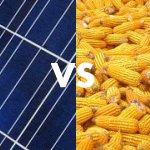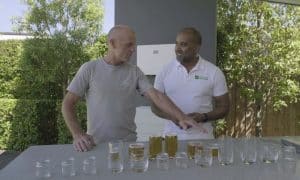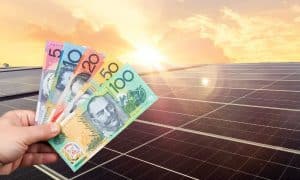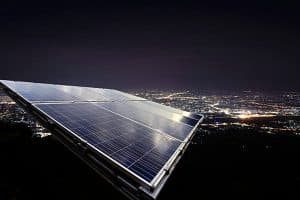Researchers from University of California – Santa Barbara (UCSB) and the Norwegian University of Science and Technology have determined solar panels are much more efficient than biomass as energy sources to fuel vehicles.
The USA’s love affair with corn ethanol is only deepening – production grew from 4.7 billion gallons in 2007 to 7.5 billion gallons last year. But instead of reducing greenhouse gas emissions (which was part of the goal in their use), it may be increasing them.
Turning food into fuel has also affected corn prices globally and tied up vast amounts of farm land.
The researchers examined various ways of using sunlight to power cars:
a) converting corn or other plants to ethanol;
b) converting energy crops into electricity for battery electric vehicles (BEVs) rather than producing ethanol;
c) using solar panels to convert sunlight directly into electricity for BEVs.
“PV is orders of magnitude more efficient than biofuels pathways in terms of land use – 30, 50, even 200 times more efficient – depending on the specific crop and local conditions,” says UCSB Bren School of Environmental Science & Management Professor and LCA expert Roland Geyer. “You get the same amount of energy using much less land, and PV doesn’t require farm land.”
In a paper titled “Spatially Explicit Life Cycle Assessment of Sun-to-Wheels Transportation Pathways in the U.S.”; published in the journal Environmental Science & Technology, the authors state even the most efficient biomass-based systems require 29 times more land than the PV-based alternative in the same locations.
“PV BEV systems also have the lowest life-cycle GHG emissions throughout the U.S. and the lowest fossil fuel inputs, except in locations that have very high hypothetical switchgrass yields of 16 or more tons per hectare,” states Professor Geyer.
The Professor says photosynthesis is the bottleneck for biofuel crops. “It’s at best 1-percent efficient at converting sunlight to crop, while today’s thin-film PV is at least 10-percent efficient at converting sunlight to electricity.”
Silicon solar panels offer even higher conversion efficiencies; for example, REC solar panels currently have a module efficiency of 15.8%.
Professor Geyer says quick calculations suggest that with the USA’s federal tax credit for EV’s, electric vehicles are already competitive with biofuels; which are also heavily subsidised.







































